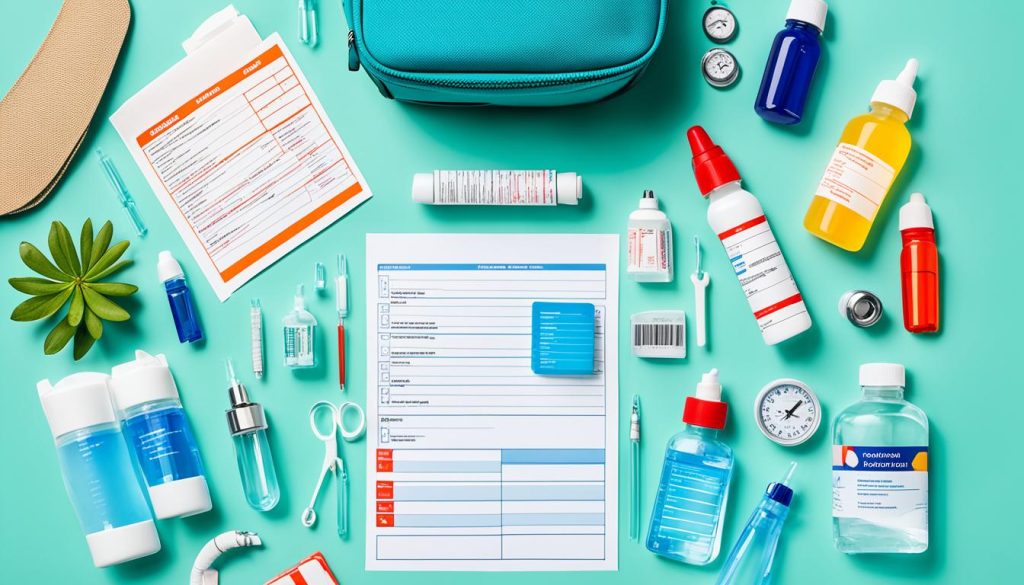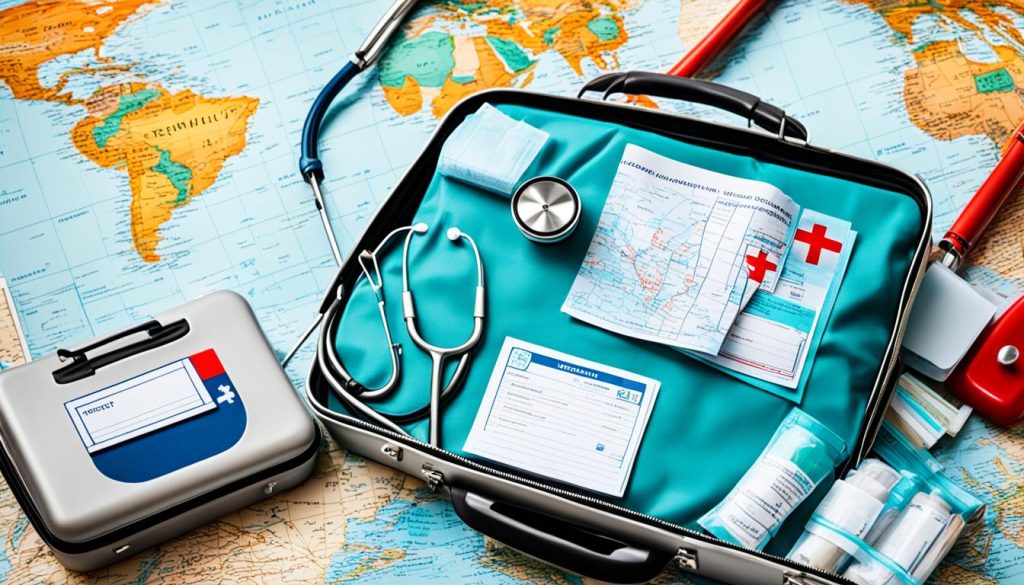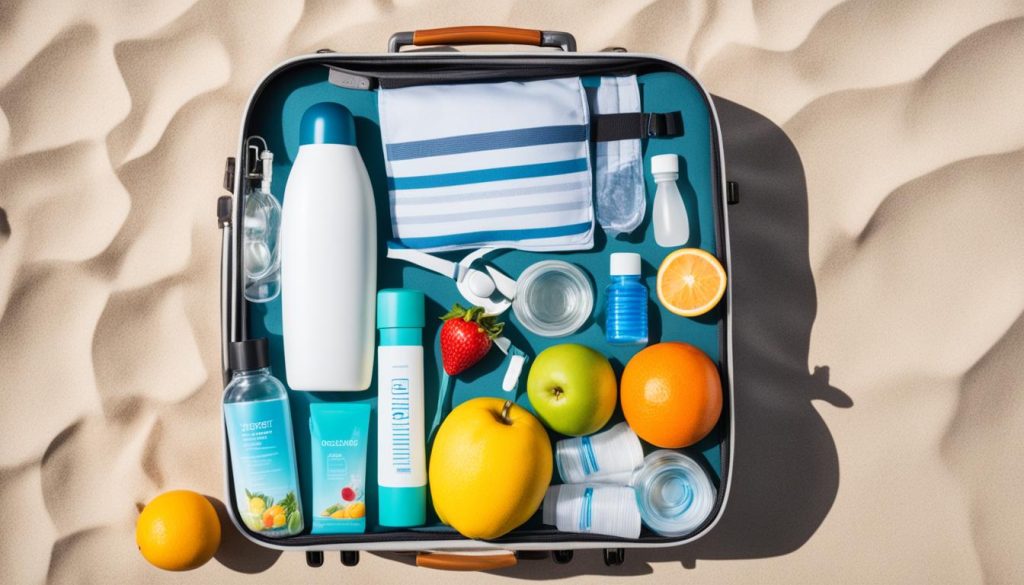When you travel, being ready for your health is key before, during, and after your trip. Getting ready for travel health can prevent illness and injury. It lets you enjoy your trip without worries. This article will give you important tips for a safe and healthy trip.
Getting ready for your trip means more than booking flights and packing. Your health and safety are crucial. You need to get the right vaccinations and pack a first-aid kit. These tips will keep you healthy and focused on making great memories.
Key Takeaways
- Proper travel health preparation can help you avoid illness, injury, and disruptions to your trip.
- Vaccinations, motion sickness remedies, and sunscreen are essential for a safe and healthy trip.
- Maintaining good hygiene, staying hydrated, and getting enough sleep are crucial for staying healthy while traveling.
- Packing a comprehensive first-aid kit and prescription medications can provide peace of mind during your travels.
- Adjusting to time zone changes and staying active can help you feel your best throughout your trip.
Remember, your health and safety are most important when planning a trip. By following these key travel health tips, you can make sure your next adventure is both safe and fun123.
The Importance of Travel Health Preparedness
Traveling can be thrilling, but it’s key to think about your health and safety first4. Make sure to see a healthcare provider a month before you go to get the right vaccines and meds for your destination4. Also, many health plans don’t cover costs when you’re abroad, so get travel insurance that includes healthcare and emergency help5.
Staying Healthy Before, During, and After Travel
Creating a detailed travel health kit is a must in your planning4. This kit should have your meds, a first aid kit, bug spray, sunscreen, and ways to clean water4. While you’re away, pick safe ways to get around, as car crashes are a big risk for healthy travelers4. Keep away from bug bites to avoid diseases from mosquitoes, ticks, and fleas4. If you get hurt or sick and can’t handle it with basic first aid or over-the-counter drugs, get medical help right away4.
Assessing Health Risks and Safety Concerns
Before you go, look into the health risks and safety issues of your destination4. Watch out for unsafe food and water, as they can cause stomach problems and other illnesses4. Also, protect yourself from the sun by using sunscreen with SPF 15 or higher4. Keep your hands clean with soap and water or sanitizer to stop germs from spreading4. Be careful around animals to avoid rabies and infections from bites4, and follow advice on safe water use to prevent drowning, especially where help is hard to get4. If you get sick after returning, with a fever, see a doctor and tell them about your trip4.
By being careful and keeping your health in mind, you can have a safe and fun trip. Remember, being well-prepared and careful is how you stay healthy while seeing the world45.
Pre-Travel Health Checklist
Before you start your next adventure, make sure you’re thinking about your health. A detailed pre-travel health checklist can help you get ready for any challenges you might face. It covers everything from getting the right vaccinations to getting travel insurance. This guide will help you keep your health safe and enjoy your trip.
Getting Vaccinations and Medications
Start by talking to a travel medicine specialist6. Experts suggest this for all travelers, especially if you have complex health issues or plan to do risky activities. They’ll look at your health history and travel plans to figure out what shots and meds you need.
6 Your doctor will ask about your health, allergies, and what medicines you’re on. They’ll also think about where you’re going, if there are any diseases there, how long you’ll be away, and why you’re traveling6. It’s important to keep your vaccinations up to date, including COVID-19 shots6.
Travel Insurance and Emergency Planning
7 With over half of US travelers planning to go abroad this year, getting travel health insurance is a smart move7. This insurance can cover medical emergencies, getting you to a hospital, and even cutting your trip short if you get sick7. Check the CDC website for info on travel vaccines7.
7 Also, think about making advanced directives like a living will or healthcare power of attorney. These outline your medical wishes if you can’t make decisions while traveling7. Look at Forbes’ list of top travel insurance companies to find a good plan for you.

8 As you get ready to leave, don’t forget to pack your important medicines, like prescription drugs and pain relievers8. The University Hospitals’ Roe Green Center for Travel Medicine & Global Health can help you know what over-the-counter items you should bring8.
By following this detailed pre-travel checklist, you can go on your trip feeling confident. You’ll know you’ve done everything you can to stay healthy. Stay safe, stay healthy, and have a great time!
travel health tips for a Safe and Healthy Trip
When you travel, making sure you’re healthy and safe is key. Focus on safe transportation, bug bite prevention, and being careful with food, water, and animal safety. This way, you’ll have a great time and stay healthy9.
Choosing Safe Transportation and Avoiding Bug Bites
Be careful when picking how you get around. Always use seatbelts and be careful when crossing streets10. Use insect repellent often and wear long sleeves and pants to keep bugs away. This helps stop diseases like Zika, malaria, and Lyme disease10.
Staying Safe Around Food, Water, and Animals
Be smart with food and water. Stick to drinks in bottles, cans, or that are hot. Avoid raw fruits and veggies unless you can clean and peel them well10. Keep away from animals to avoid getting hurt or catching diseases like rabies10.
By following these travel health tips, you can relax and enjoy your trip. You’ll know you’re taking steps to stay safe and healthy9.

Your health and safety should always come first when you travel. By taking these easy steps, you can have a safe and healthy trip. And you’ll make memories that last without taking big risks9.
| Travel Health Concern | Preventive Measures |
|---|---|
| Safe Transportation | Wear seatbelts, be cautious when crossing the street |
| Bug Bite Prevention | Use insect repellent, cover exposed skin |
| Food and Water Safety | Stick to bottled, canned, or hot drinks, avoid raw fruits and vegetables |
| Animal Safety | Steer clear of animals, including pets and wildlife |
“Staying healthy while traveling is not a luxury, but a necessity. By following these simple tips, you can enjoy your trip with peace of mind and create memories that will last a lifetime.” – Travel Health Expert11
Remember, your health and safety should always be the top priority when traveling. By following these travel health tips, you can have a safe and healthy trip. And you’ll make memories that last without taking big risks9.
Post-Travel Health Precautions
After your trip, pay attention to any health issues that might have come up. Even if you went to a new place or changed time zones, taking care of your health after traveling is key. It helps you dodge illnesses or problems12.
If you feel sick, like with a fever, get medical help fast. Tell your doctor about where you’ve been12. Quick medical care can fix issues from your trip, help you get better, and stop diseases from spreading13.
Traveler’s diarrhea hits about one-third of travelers to less developed areas12. And jet lag can mess with your sleep and daily life if you cross many time zones12. Knowing about these issues and acting early can make you feel better fast and keep your trip memories good.
Always watch out for your health and safety, even when you’re back home. Being informed and getting medical help when needed makes sure your post-travel time is healthy and good.
In some places, getting infections from swimming in fresh water is common. This is true in Brazil, Egypt, most of sub-Saharan Africa, Southern China, the Philippines, and Southeast Asia12. Also, high altitude sickness can happen if you go up too fast over 8,000 feet (2,400 meters)12. Knowing about these risks helps you prepare and act if problems come up.
Your health and happiness should always come first, before and after traveling. By being careful and getting medical help when needed, you make sure your time after traveling is good and rewarding.
Packing a Comprehensive Travel Health Kit
When you’re planning your next trip, don’t forget to pack a travel health kit. This kit should have travel medications and first aid supplies for any health issues you might face14. It’s key to be ready for anything, especially in places where medical help might be hard to get14.
Essential Medications and First Aid Supplies
Your health kit must have your prescription drugs and over-the-counter items like pain relievers and bandages14. For trips to remote or risky places, think about packing sterile tools like needles and IV equipment14. Companies like FirstAid4Less and Nomad have kits for extreme adventures14. Always keep your meds in their original packaging and carry your prescriptions, including generic names, for when you need to replace them14.
Insect Repellent, Sunscreen, and Sanitizers
Don’t forget to add insect repellent, sunscreen, and hand sanitizers to your health kit15. Keeping insects at bay is crucial to avoid diseases they carry14. Sunscreen protects against sunburn and skin problems14. Hand sanitizers with at least 60% alcohol are a must15.
“Having the right supplies on hand can help you address minor health issues and stay comfortable during your travels.”
With a well-stocked health kit, you’re ready for any health issue that comes up16. Just remember to check the expiration dates and keep it away from kids14.
| Item | Importance |
|---|---|
| Prescription Medications | Ensure access to necessary medications during travel |
| Over-the-Counter Medications | Address common health issues like pain, diarrhea, and allergies |
| First Aid Supplies | Treat minor injuries and wounds |
| Insect Repellent | Prevent insect-borne diseases |
| Sunscreen | Protect against harmful UV exposure |
| Hand Sanitizers | Maintain good hygiene and reduce the risk of illness |
With a complete health kit, you’re set for any health issue that might pop up16. Just remember to check the expiration dates and keep it away from kids14.
Staying Active and Adjusting to Time Zones
Staying active while traveling can help fight jet lag and adjust to new time zones. Moving around helps prevent blood clots and muscle stiffness17. Traveling a few time zones, like from the east to the west coast of the U.S., makes it easier to adjust17. When you arrive, stay awake during the day and avoid naps to adapt to the new time17. Drinking water, and avoiding too much caffeine and alcohol, also helps with the transition.
Keeping active and adjusting your sleep schedule makes travel healthier and more fun.17 It usually takes one day per time zone to adjust your body clock after traveling1718. Jet lag can happen even with a one-hour time difference, but it’s more common with bigger time zone changes18.
- 17 Driving through time zones gradually helps adjust your body clock for each 10-hour change.
- 17 Crossing oceans and continents makes jet lag worse.
- 17 Traveling west is easier because it adjusts your body clock to a later time.
- 17 Morning sunlight exposure helps set your body clock.
- 18 Traveling east makes you jet lagged for as many days as time zones crossed. Traveling west makes you jet lagged about two days for three time zones west.
- 18 Melatonin supplements, 0.5 mg, help set your body clock 13 hours before waking up.
- 18 Short naps in the days after arrival help avoid night sleep problems.
18 Kids adjust to jet lag easily, unlike adults18. Most people find it hard to sleep in temperatures over 75 degrees Fahrenheit or under 65 degrees Fahrenheit18. Altitudes above 13,200 feet take weeks to get used to, and over 6,000 feet are tough for those with breathing issues.
“A 5 mg dose of melatonin can help set your body clock to the new time, with different times for morning and evening.”
Conclusion
Getting ready for your health and safety before, during, and after your trip is key to a stress-free and fun journey. This travel health tips summary will help you stay safe and healthy. It lets you enjoy your travels to the fullest19.
Always visit your doctor, pack a travel health kit, and stay alert for safety tips during your trip. Research shows that ginkgo leaf extracts are safe and work well19. Also, insect repellents with DEET are better than other natural options1920.
With the right preparation and attitude, you can travel the world safely and confidently. Taking steps to protect your health means you can dive into new experiences and make unforgettable memories. travel health tips summary
FAQ
Why is it important to follow travel health tips?
Following travel health tips helps you avoid getting sick or hurt. It also keeps your trip smooth. By being proactive, you can enjoy your journey without worries.
What should I do before my trip to prepare for my health?
Before you go, check the health risks and safety at your destination. Make sure you have any needed shots or meds. Also, look into your health insurance and think about getting travel insurance.
How can I stay healthy during my travels?
Stay healthy by choosing safe ways to get around. Use bug spray, drink safe water, and avoid animals. This helps prevent injuries and diseases.
What should I do after my trip to ensure my health?
After your trip, watch for signs you might need a doctor. If you’re feeling sick, especially with a fever, get help right away.
What should I pack in my travel health kit?
Pack your prescription meds and over-the-counter items like pain relievers and bandages. Don’t forget insect repellent, sunscreen, and hand sanitizers.
How can I adjust to the new time zone during my travels?
Adjust by staying up and active during the day. Avoid napping and drink lots of water. Limit your caffeine and alcohol.

